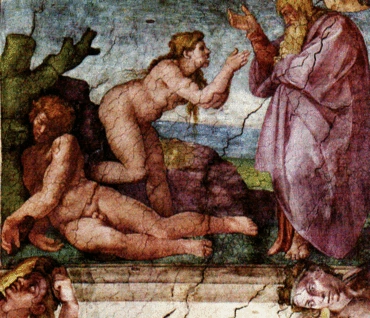Erläuterung zu Genesis 2:23
Durch Brian David (maschinell übersetzt in Deutsch)

Die himmlischen Menschen der ältesten Kirche, die von der Liebe des Herrn motiviert waren, befanden sich in einem ständigen Zustand der Trennung zwischen ihrem Inneren und ihrem Äußeren. Sie konnten äußerlich mit den Notwendigkeiten des Lebens beschäftigt sein - Nahrung sammeln und zubereiten, sich um Kinder kümmern, füreinander sorgen -, während sie sich tief in ihrem Geist ständig des Herrn und der Engel und des geistigen Wertes selbst der äußeren Dinge, die sie taten, bewusst waren. Aber um ihnen das Gefühl zu geben, dass das Leben ihr eigenes war, musste der Herr ihre Äußerlichkeiten betonen und ihnen die Hauptrolle geben. So verloren die Menschen ihr ständiges Bewusstsein für geistliche Dinge.
Das wird hier dargestellt. "Knochen von meinem Gebein" bedeutet, dass das tote, höllische Selbstverständnis im äußeren Leben mit demselben im inneren Leben verbunden war. "Fleisch von meinem Fleisch" bedeutet, dass der lebendige, himmlische Sinn des Selbst im Äußeren auch mit dem Inneren verbunden ist. "Frau" bedeutet den Sinn des Selbst als einen vollständigen Lebenszustand, und "Mann" - hier in einem spezifisch männlichen Sinn verwendet - bedeutet intellektuelle Gedanken und Konzepte im inneren Menschen. Auf allen Ebenen dominierte also bei den Menschen der Urkirche der äußere Sinn, dass das Leben ihr eigenes sei.
(Verweise: Himmlischen Geheimnissen 156, 0157, 158, 159)
Arcana Coelestia #6637
6637. 'These are the names of the children of Israel' means the essential nature of the Church. This is clear from the meaning of' the name as the essential nature, dealt with in 144, 145, 1754, 1896, 2009, 2628, 2724, 3006, 3421; from the representation of 'the sons of Israel' as spiritual truths, dealt with in 5414, 5879, 5951; and from the representation of 'Israel' as the good of truth, which is spiritual good, dealt with in 3654, 4598, 5803, 5806, 5812, 5817, 5819, 5826, 5833. Since Israel' represents the good of truth or spiritual good and 'his sons' represent spiritual truths in the natural, 'the sons of Israel' also represent the Church, for what makes it the Church is spiritual good and the truths that spring from that good. A person without spiritual good, that is, the good of charity, and without spiritual truths, that is, the truths of faith, does not belong to the Church in spite of having been born within the Church. The whole of the Lord's heavenly kingdom possesses the good of love and faith, and unless the Church possesses good like that it cannot be the Church since it is not joined to heaven; for the Church is the Lord's kingdom on earth.
[2] The term 'Church' is not used because it is the place where the Word is and teachings drawn from it, or because it is where the Lord is known and the sacraments are celebrated. Rather it is the Church because it lives in accordance with the Word or with teachings drawn from the Word, and seeks to make those teachings its rule of life. People who do not live like this do not belong to the Church but are outside it; and those who lead wicked lives, thus lives contrary to that teaching, are further away outside the Church than gentiles who know nothing whatever about the Word, the Lord, or the sacraments. For since those people are acquainted with the forms of good that the Church fosters and with the truths it teaches they annihilate the Church within themselves, something gentiles cannot do because they are unacquainted with those things. It should also be realized that everyone who leads a good life, in charity and faith, is a Church, and is a kingdom of the Lord. He is for that reason also called a temple, and a house of God too. Those who are Churches individually, no matter how remote from one another they may be, constitute one Church collectively. This then is the Church meant by the expression 'the children of Israel' here and in what follows.






